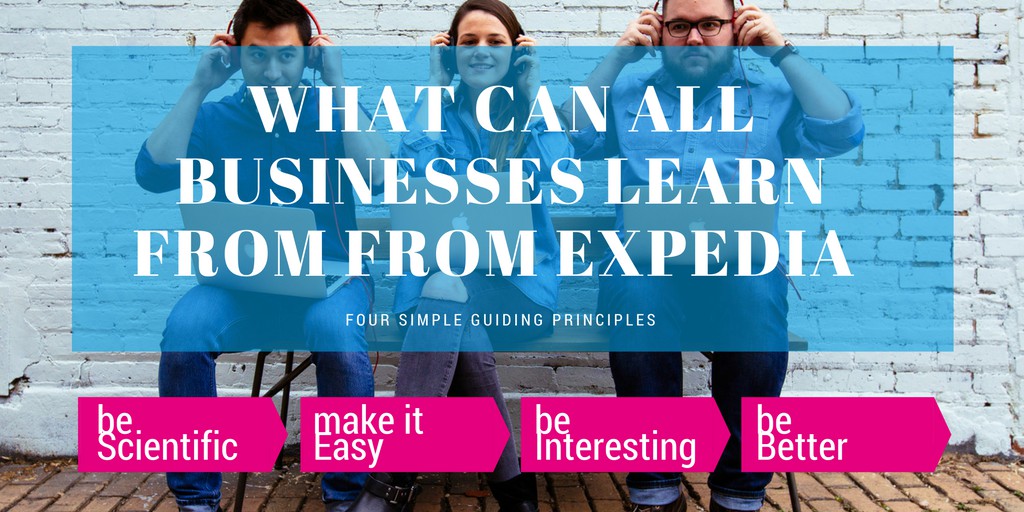What we can all learn from Expedia and why you shouldn’t be the new Uber.

Right off to bat I’d like to give a huge shout out to John Kim (former Chief Product Officer at Expedia and new President of HomeAway) and Aman Bhutani (President Brand Expedia Group) for the inspiration and content in this post. Thanks, guys.
I came across a video the guys gave to Expedia partners, containing what they describe as the Expedia APPROACH. 4 key principles. It’s a long video but well worth the watch as it doesn’t talk about the product, but about they way they approach the business. And it’s something we can all apply.
Let’s start with the title. Why you shouldn’t be the new Uber. Hearing people say that they are going to be the Uber of something seems to be the catchphrase of season. The Uber of hairdressing, the Uber of pet grooming, the Uber of taxicabs – oh wait…
You see the thing that John sums up perfectly is that the world is moving too fast to base a business on predicting the future. For every one that gets it right, there will be a thousand that miss the mark. And for a lot of us our growing target demographic is one that we don’t even seem to understand. We label them Millenials and call them entitled. How can we possibly predict their future behaviour, when we don’t understand how they act now? Why do they care less about learning to drive and taking advantage of the freedom a car gives to them – because freedom to them is the ability to connect openly with people, so yes, they would rather sit in the passenger seat on Snapchat or WhatsApp, than in the driver seat.
How can we possibly predict their future behaviour, when we don’t understand how they act now? Why do they care less about learning to drive and taking advantage of the freedom a car gives to them – because freedom to them is the ability to connect openly with people, so yes, they would rather sit in the passenger seat on Snapchat or WhatsApp, than in the driver seat.
So what Amar and John cover perfectly is we should stop trying to guess the future but focus on what we can control, and how we can slowly improve every day. Invest in your approach.
On to the Four Principles of the Expedia Approach:
1. Be Scientific. Test, Measure, Test, Measure. Rinse and Repeat. In the marketing world today, finding out what isn’t working is more important than finding out what is working. Tools we use like Marketing Automation and Lead Attribution modeling are key to helping you work out that’s going on. Work out the problem, get close to it, build a hypothesis and test it. Remember that failure is your friend, it’s the bricks that you can build your approach on.
2. Make it Easy. Everyone seems to have less time today, and the availability of information actually makes things more complicated, not easier. Let’s take Expedia’s market as an example. Picking a holiday destination is hard. It’s not just the amount of places you can go, or the amount of places you can stay when you decide where to go, but there is what you can do when you get there. We also have to consider How we want to travel. Do we want a hotel (Expedia), do we want a rent a home abroad (HomeAway) or do we want to rent someone’s sofa (AirBnB)? This will be the first generation that will spend more time playing games than learning in full-time study, so you need to carefully consider how they will engage with your content.
3. Be Interesting. John Kim sums this up perfectly in the video. It used to be about relevance, now it has to be about being interesting. If you’re not interesting, then you need to rethink your message and how it connects with your prospects/audience. Everyone has the opportunity to be a media company now and you have so many platforms on which to tell your story. But will anyone care?
4. Be Better than Yesterday. This is my personal favourite as it taps into something I truly believe. Trying to be the best isn’t measurable. Neither is trying to be great, or epic. You may set yourself the task to crush it every day, and these are all good things to focus on. But how do you track improvement? Trying to be better than you were a year ago is an easy statement to make, as you can expect to make big leaps in that time, but a year from now you really won’t remember what it feels like to be you today. Whereas if you try and be a little bit better than yesterday, you’ll put in place a process of continual improvement. Make small changes, and get used to winning. Don’t look for big leaps, look for small incremental amounts each day and you’ll be unstoppable. Here is the full video. Enjoy. (also if Johns reading this – hit me up for game of Starcraft 2)